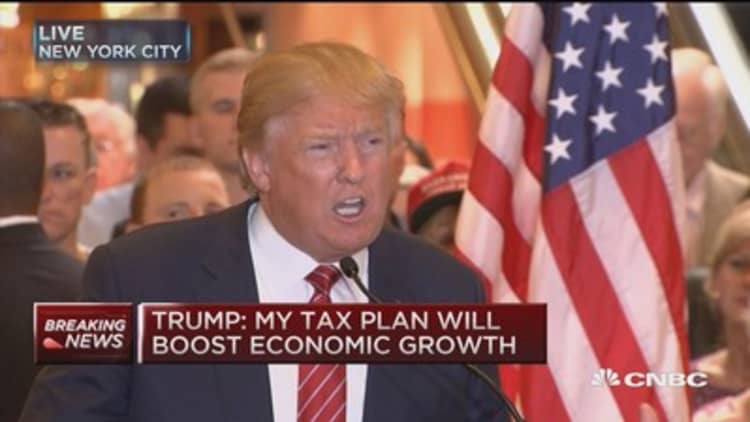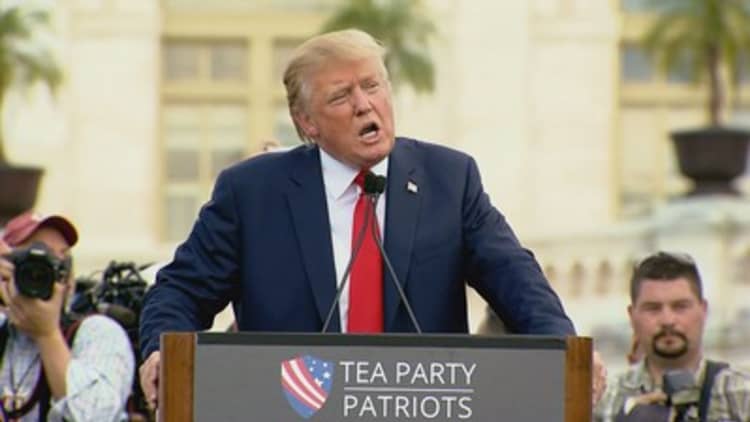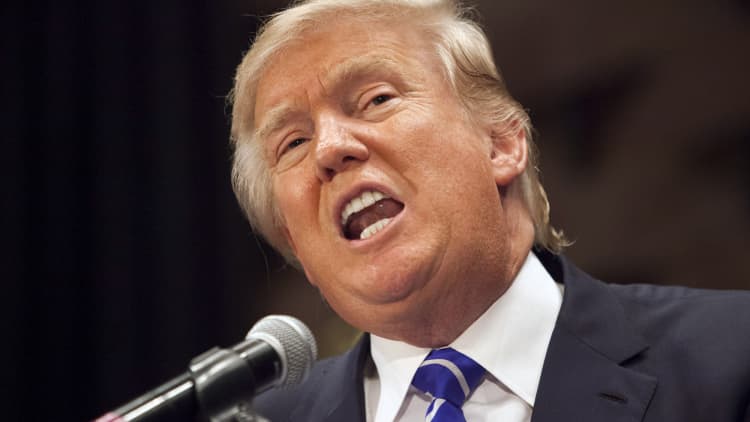


Perhaps the most dangerous game in political punditry is declaring an end to the strange, narcissistic odyssey that is the Donald Trump presidential campaign.
But the end may actually be near.
Trump went on CBS' "60 Minutes" on Sunday night and repeated some of his more outlandish plans, including building a huge and classy border wall with Mexico and making the Chinese respect him "just like I have the Chinese banks in my building, they listen to me."
He also said of the roughly 11 million undocumented immigrants in the United States "we are rounding them up in a very humane way and a very nice way and they are going to be happy because they want to be legalized. … I know it doesn't sound nice but not everything is nice."
"Rounding up" and forcibly relocating millions of people has never worked out very well in human history.
After the interview, Trump did what he always does: Go on Twitter and slam the interviewer—in this case CBS' immensely talented and relentless Scott Pelley. To Trump, any journalist who asks serious questions and won't accept nonsensical, word-salad answers is a "hater" and all-around terrible person.
But slamming journalists and railing against undocumented immigrants is not going to derail Trump. It's a large part of why he is so popular. What will—and already is—slowing Trump down is the realization among Republicans that he is basically running as an anti-immigrant Democrat.
On "60 Minutes," Trump pledged to release a tax plan that would raise levies on the wealthy and cut them, in some cases to zero, on the less well off. And he again proposed a universal health plan that sounds a great deal like Obamacare.
Read More
"Everybody has got to be covered, Trump said. "I am going to take care of everybody. … The government is going to pay for [the uninsured] but we are going to save so much on the other side. But for the most part it's going to be a private plan and people are going to be able to go out and negotiate great plans with lots of different competition with lots of competitors with great companies and they can have their doctors, they can have plans, they can have everything."
Giving people the ability to shop for different private plans in a single marketplace while offering subsidies to help those who can't afford premiums is the basic premise of Obamacare. It's also the model for the Massachusetts plan promoted by then-Gov. Mitt Romney. And it didn't work too well for Romney among Republicans or when making the case against Obama in the general election.
Trump has some other stances that now sound Republican, including his new-found opposition to abortion. But his record of being strongly pro-choice is plain for all Republicans to see.
Trump himself acknowledged in 2004 in an interview with CNN that "I probably identify more as a Democrat." At some point, people who actually vote in Republican primaries and caucuses will realize that the billionaire real estate mogul is not really one of them.
And despite Trump's protestations and citing of unscientific, online polls, the decline has already begun.
Just look at the aggregate of polls maintained by Real Clear Politics that shows Trump peaking at around 30 percent of the GOP vote and now has him down to 23 percent, still the front-runner but moving in the wrong direction. Trump hasn't lost much ground yet in Iowa polls but he's down from 32.8 percent to 25.3 percent in New Hampshire. In the latest NBC/Wall Street Journal poll, Trump is in a virtual tie with Ben Carson.
Could Trump turn this around and rise again?
Sure he could. Predicting his demise so far has been a fool's game. Trump could deploy some of his millions to run ads touting his promise of a greater, stronger America that is rich again and somehow "takes back" the jobs lost to other countries while giving everyone health care, getting rid of undocumented immigrants, smashing ISIS and building a gorgeous and impenetrable wall on the Mexican border.
That could slow down the slide but it probably can't stop it, and so far Trump has shown a very strong inclination to rely on free rather than paid media. Declining poll numbers and general boredom with the Trump Show will eventually reduce that free media.
So the question at some point—and probably soon—will be on who replaces Trump in the top slot. So far it's been either retired neurosurgeon Carson and former HP CEO Carly Fiorina. But both those candidates have serious flaws (Carson is very low energy and doesn't think a Muslim should ever be president and Fiorina struggles with her business record).
The most likely candidates to get the nomination remain former Florida Gov. Jeb Bush and Florida Sen. Marco Rubio. And right now Rubio has the edge given his recent strong debate performances. The next debate, coming up on CNBC on Oct. 28, will go a long way to deciding who becomes the post-Trump GOP front-runner as the actual voting draws closer. Bush needs a knockout performance to quiet donors worried about his stagnant poll numbers.
If Bush doesn't get it, Rubio could head into 2016 as the favorite for the nomination. And the summer (and early fall) of Trump could recede into strange memory and the political history books.
—Ben White is Politico's chief economic correspondent and a CNBC contributor. He also authors the daily tip sheet Politico Morning Money [politico.com/morningmoney]. Follow him on Twitter @morningmoneyben.



